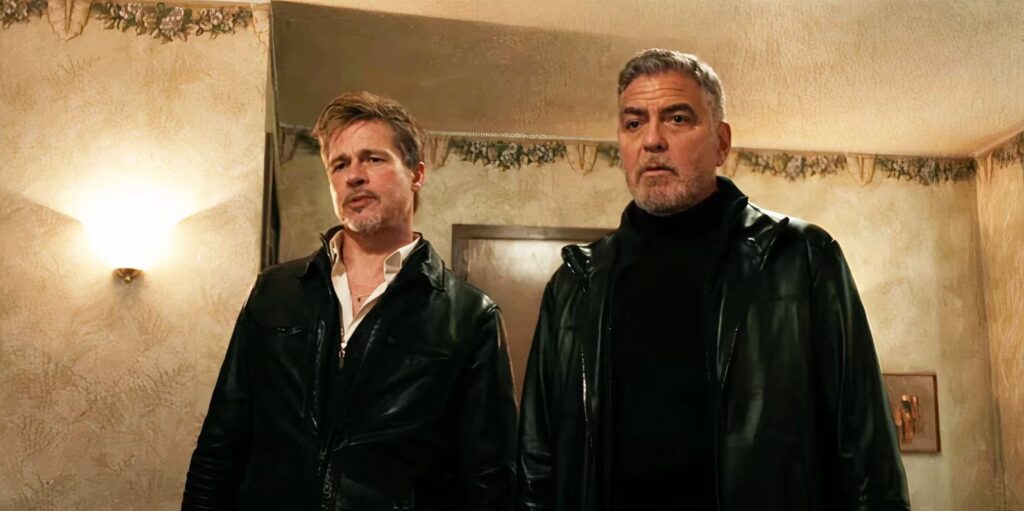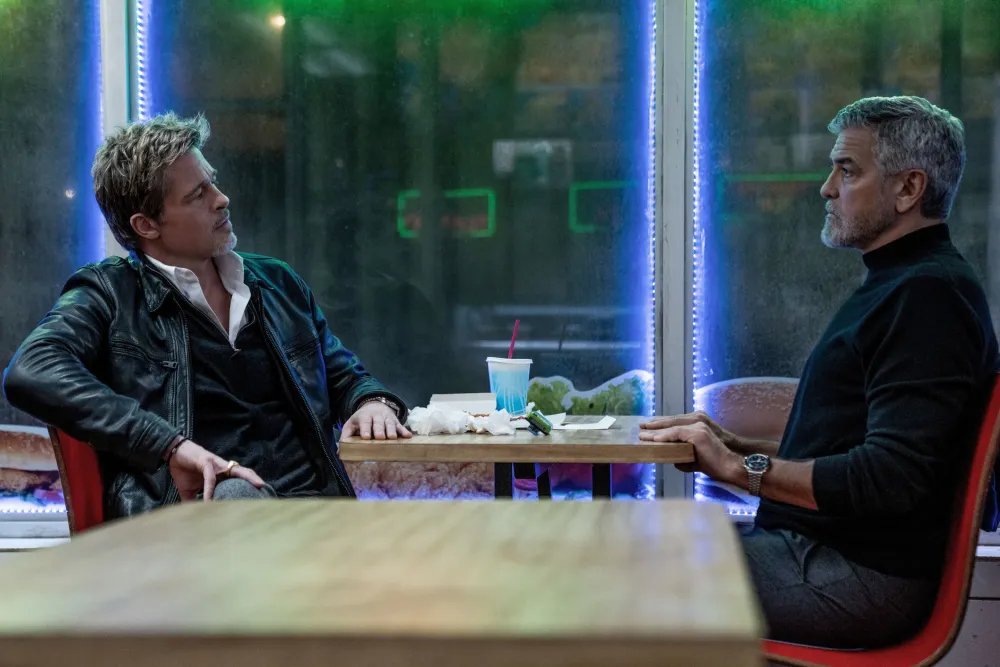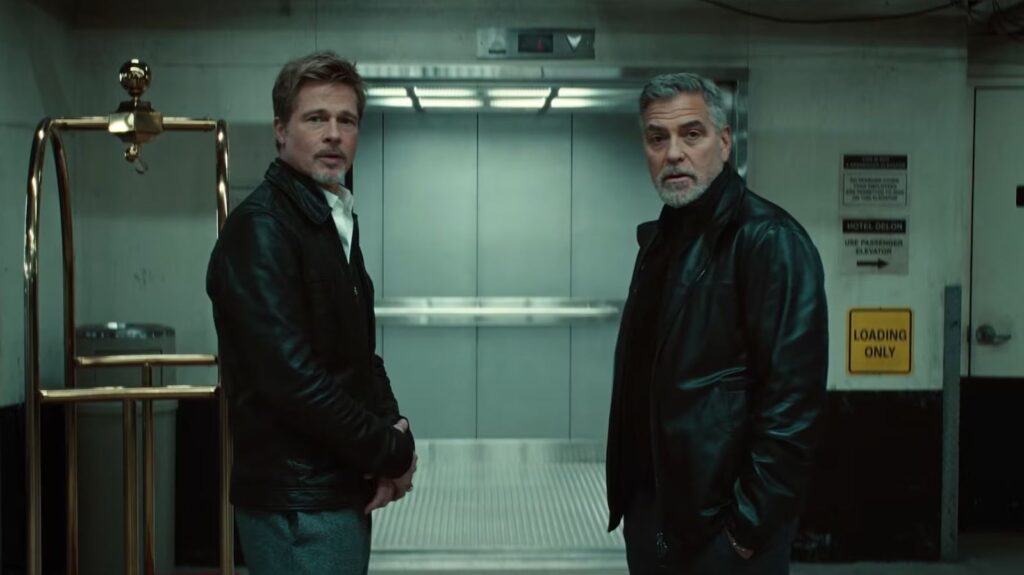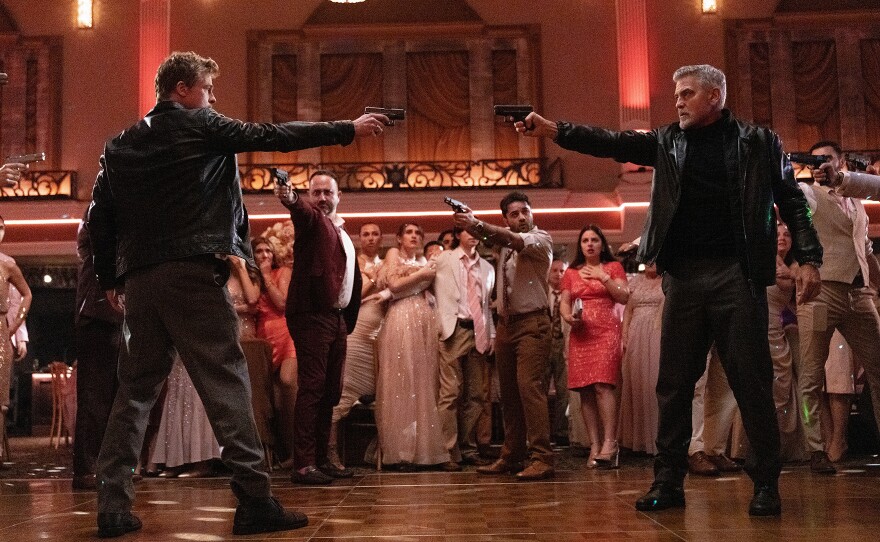
The first time we hear George Clooney’s voice in Wolfs, he’s on the other end of the phone, speaking in a clipped, measured tone that instantly conveys a sense of authority. A woman (Amy Ryan) has gotten herself into a spot of trouble—there’s a half-naked dead man in her hotel room, though he’s definitely “not a prostitute”—and she’s calling the mysterious number that somebody once gave her for existential emergencies. The man who answers is cool, confident, reassuring—the best in the business. When he arrives in person, hands shielded in blue latex gloves and ready to make her problem magically disappear, he insists that she’s found the right guy: “There’s nobody who can do what I do.”
The central joke of Wolfs is that exactly one other person can do what he does—and that person is played by Brad Pitt. It’s been 16 years since one of Hollywood’s most glamorous bromances shared the screen, when (spoiler alert) Clooney blasted a hole in Pitt’s head midway through Burn After Reading. Since then, they’ve both had solid careers independently—securing Oscar nominations (Up in the Air and The Descendants for Clooney, Moneyball and Once Upon a Time in Hollywood for Pitt), headlining hits (Gravity and Ticket to Paradise, World War Z and Bullet Train), and appearing in a range of original pictures (Tomorrowland and Hail Caesar, Ad Astra and Babylon) that managed to exist outside the industry’s perpetual franchise machine. The promise of Wolfs is that it reunites these two A-listers—among the last vestiges of a bygone era when the audience’s level of interest in a new movie was directly correlated to the names on the marquee—and allows them to reignite the chic chemistry that once powered the Ocean’s films.

Welp, it was a nice theory. Wolfs isn’t an especially bad movie, and its stars aren’t bad in it. But it has no spark, no excitement, no joie de vivre. It feels like a product of reverse engineering, as though studio executives decided that Clooney and Pitt should play twin fixers and then hired someone to build a story around that concept.
That someone is Jon Watts, best known for shepherding the wildly successful new Spider-Man trilogy. He makes intellectual sense for the project, given his lack of authorial personality and his willingness to defer to his actors. But it turns out that when you remove the panache of Steven Soderbergh and replace it with the generic competence of an overseer whose primary responsibility is to sate fanboy appetites, you lose a whole lot of both style and substance. Remember in Ocean’s Eleven when Clooney wondered why hallways are always painted a certain color and Pitt responded, “They say taupe is very soothing”? I don’t quite know why that exchange stuck with me, except that it features an ineffable rhythm—a musicality that’s largely absent here. There’s only one memorable set piece in this movie—a long, hectic chase through the streets of New York’s Chinatown—and it’s notable for all the wrong reasons, given its sloppy choreography and interminable length.

Yet the biggest problem with Wolfs lies not with its execution but with its premise. Clooney and Pitt (Wikipedia currently credits them as Jack and Nick, respectively, though I don’t remember hearing either character’s name) aren’t so much playing mirror images of each other as the exact same guy—essentially a variation of Clooney’s self-described “janitor” in Michael Clayton, only with the soulful disenchantment swapped out in favor of no-frills professionalism. Sure, they each believe they’re superior to the other, leading to some cute bits of self-regard and suspicion—“You’re gonna steal it,” Jack says repeatedly when performing various tricks of the trade as Nick watches—but their sameness deflates any sense of whimsy or personality. The result is a high-wattage duo that operates as a flavorless peanut-butter-and-peanut-butter sandwich.
When Wolfs does work, it does so by playfully undercutting its stars’ inherent magnetism. There’s a throwaway moment late in the movie during a (hopelessly incoherent) shootout when one fixer passes the other a pistol, only for the handoff to be fumbled and the weapon to be squandered. That’s funny! There is also an oddly delightful sequence in which a secondary character (Austin Abrams) receives a rambling monologue, the camera slowly pushing in on his face as he litters his expository babbling with esoteric details and non sequiturs. The always-charming Poorna Jagannathan briefly shows up to dress both men down, while the voice of an unseen executive belongs to none other than Frances McDormand. (Richard Kind also has a short appearance; he’s thoroughly wasted.)

The movie that Wolfs desperately aspires to be, in terms of both comic patter and underworld storytelling, is Pulp Fiction. It’s no crime to fail to equal that masterpiece, but Watts’ laborious attempt to do so—he even sets the final scene at a breakfast diner—is rather pathetic. (Beyond Michael Clayton, the main analogue for our heroes here is Harvey Keitel’s character there, a man who was called—wait for it—The Wolf.) A more recent point of comparison is The Nice Guys, Shane Black’s chaotic and wonderful buddy comedy about two investigators in way over their heads. Watts’ screenplay is similarly messy—the plot, which grows to implicate stolen drugs, the Albanian mob, and a corrupt political campaign, is convoluted and incomprehensible—but he comes nowhere close to mimicking the marvelous banter between Ryan Gosling and Russell Crowe.
That’s also a high bar, but Wolfs still feels like a missed opportunity because, you know, George Clooney and Brad Pitt… they’re good actors! They’re beautiful and charismatic, and we should be thrilled to spend two hours in their company as they boast and fight and clown and bicker. Yet the movie rarely gives them the chance to be charming or interesting, instead convincing itself that we’ll be satisfied because they’re just there. Ultimately, Wolfs is that taupe hallway in cinematic form—soothing, maybe, but also inoffensive and insubstantial, to the point where it barely registers at all.
Grade: C
Jeremy Beck is the editor-in-chief of MovieManifesto. He watches more movies and television than he probably should.
